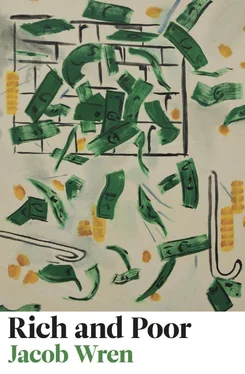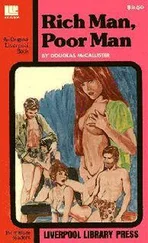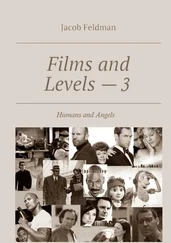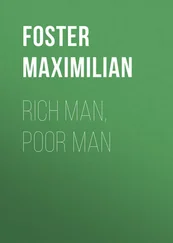2.
I put off making the call for almost a week. I don’t know how to begin or exactly what my strategy should be. I have a plan but at the same time realize it’s no plan at all. I survey my argument again and again: before you had a plan, which I fucked, but your plan was little more than a desire for revenge. What I am proposing is justice. Justice is better than revenge. I suspect that Emmett cares nothing for justice, that he is deeply and utterly immoral. But I’m counting on the fact that he still wants to attack, and that he will see the benefit of attacking from the moral high ground, see it is more sustainable, a long-term game. When the poor organize, unionize, demand their fair share, the rich make less, over time gradually becoming less powerful. They are still rich, but no longer so omnipotent. Someone can take them on, and if you win just one battle, others will be tempted to try as well. Emmett was never a true friend, but he knows me. There might still be some tattered remnants of trust.
But procrastination takes on a life of its own, and there were at least two more meetings with everyone before I finally found the energy to make the call. There was a kind of fear at these meetings. We had no legal right to strike, not even for one day, and our illegal action would certainly be met with violence. We had no idea how much or what form it would take, but most likely it would appear soon, before the strike, in order to prevent it, scare us straight. At each meeting, I saw it as my job to counterbalance the fear with something else: hope, reason, confidence — anything, I didn’t really know what would work best or what would help. Fear was also a reasonable reaction to what we were about to attempt, and I didn’t exactly know what courage was or where it might come from. Did I have courage when I wrapped the piano wire around that bastard’s neck? Was courage what blinded me to the fact that my plan was too narrow, was unlikely to work? My fear wasn’t of violence, for in a way I felt I was already dead. My fear was that I was leading these people towards a catastrophe just as foolish as the one I had barely survived before coming here, and that they would blame me for it, that they would end up hating me as much as I sometimes — especially in the first days I arrived — had hated myself.
And yet these meetings filled me with such a sense of possibility. All the different languages shouting out suggestions and doubts in every direction, as others rushed to translate, to keep up. It wasn’t that any of us knew what we were doing, though I suppose many assumed that I at least partially did. It was a feeling. A feeling and an energy. That we were about to attempt something that just a few weeks ago no one here had even imagined possible. A few weeks before, I had gone to the library and copied the following onto a scrap of paper:
A useful starting point for differentiating types of workers’ bargaining power is Erik Olin Wright’s distinction between associational and structural power. Associational power consists of “the various forms of power that result from the formation of collective organizations of workers” (most importantly, trade unions and political parties). Structural power, in contrast, consists of the power that accrues to workers “simply from their location… in the economic system.” Wright further divides “structural” power into two subtypes. The first subtype of structural power (which we shall call marketplace bargaining power) is the power that “results directly from tight labour markets.” The second subtype (which we shall call workplace bargaining power) is the power that results “from the strategic location of a particular group of workers within a key industrial sector.”
Marketplace bargaining power can take several forms including (1) the possession of scarce skills that are in demand by employers, (2) low levels of general unemployment and (3) the ability of workers to pull out of the labour market entirely and survive on non-wage sources of income. Workplace bargaining power, on the other hand, accrues to workers who are enmeshed in tightly integrated production processes, where a localized work stoppage in a key node can cause disruptions on a much wider scale than the stoppage itself. Such bargaining power had been in evidence when entire assembly lines have been shut down by a stoppage in one segment of the line, and when entire corporations relying on the just-in-time delivery of parts have been brought to a standstill by railway workers’ strikes.
What kind of bargaining power did we really have and what were the consequences of trying to make use of it? The produce was being grown here and now. If it wasn’t harvested it would simply rot on the vine. It couldn’t just be picked up and moved somewhere else, and everyday it was left there to rot money was being lost. How much money could they afford to lose before it would begin to hurt? In one sense the answer was a virtually infinite amount. There were so many different divisions of the organization. One division could bleed money for years while others picked up the slack. But I knew it also didn’t quite work that way. Every division needed to pull its weight, and in divisions that posted considerable losses, those at the top were chastised, could easily lose their jobs. Or the whole division could be sold off, chopped up for spare parts. So there were clearly many in each division whose lives depended on keeping the profits flowing.
Then there was the maze of subcontractors in which we found ourselves enmeshed. Each subcontractor might sell produce to many different corporations. It was the subcontractors who would feel the pain first, who would immediately lose money if the harvest were to pause, who would be fired first, easily replaced by another subcontractor long before any division, much less the larger organization, felt a fucking thing. But I didn’t want to go after the subcontractors, they were relatively powerless to help us. They drove their buses on and off the field. They packed off the crates and, much like us, received a small sum for each one, keeping most of the profits, kicking only a bit of dust in our direction. If the organization pays the subcontractors more, we won’t see even a glimpse of it. What we need is for the organization to demand that each of its subcontractors pay more, double the price for each token, that they insist and are willing to cough up for it, to pay more on the condition that our lot improves. For this to happen we must embarrass them. The price, relative to their overall profits, is small, at the very least a small cost in order to save face, to increase the possible illusion they are humane corporate citizens. How to get their attention and make sure they know why? It feels impossible but also too late to turn back. I have the strange anxiety that men with guns will march onto the field one night and simply kill us all, every last one.
1.
I think I saw Emmett. He was far away so I couldn’t be sure. But as I stared at the figure in the distance, trying to decide if it was actually him and, if so, if he had spotted me in return, I started to see the entire matter in a different light. The man who used to be my closest friend in the world had, in all likelihood, attempted to have me killed. What’s more he had done so incompetently. What does this fact, if it is a fact, tell me about my life, about friendship, about loyalty? You can tell so much about a man’s character by his friends and how he treats them. Who exactly are my friends now? I think I saw Emmett in the distance yet didn’t know if I should chase him down or let him go. I try to recall our last actual conversation but cannot. For the last three or four months, before he cut off all ties, we were both up to our necks in lawyers. And Emmett is a lawyer, I am definitely not. I believe when he realized it would most likely be him taking the fall, that I was selling him down the river, he became more of a lawyer than ever. He’s now tried to have me killed once. Why aren’t I more paranoid? Why aren’t I more on guard, nervous that he will attempt to have me killed again? Do I think I’m invincible? But nothing adds up. Emmett was never the type to mess around. If he wanted me dead I would have been dead long ago. Or something went wrong. I’m nervous I’m becoming less effective and, over the same period, perhaps Emmett has become less effective as well.
Читать дальше












